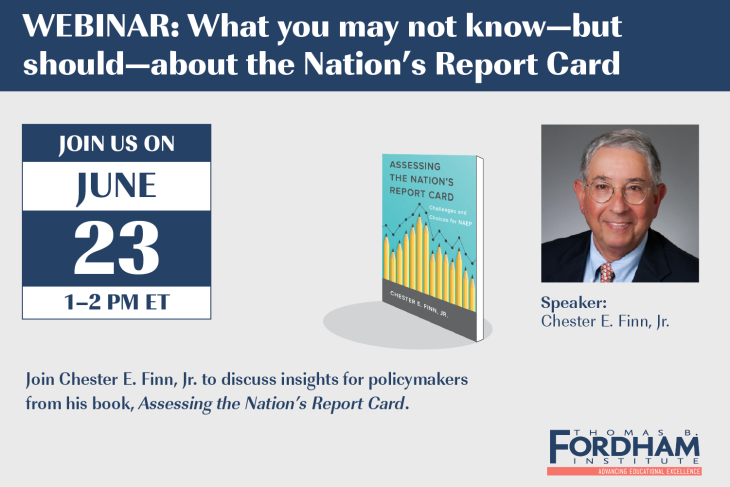Download the webinar PowerPoint.
How can state and national policymakers and education leaders gauge the academic setbacks suffered by young Americans due to Covid? How can they see whether achievement gaps between groups of students are widening or narrowing? How do we know whether eighth graders in Missouri are faring better or worse in math or reading than their peers in Michigan and Maine?
We answer such questions about K–12 achievement almost entirely thanks to a little-known but vital test, the National Assessment of Educational Progress, a.k.a. “NAEP” or the “Nation’s Report Card.”
Assessing the Nation’s Report Card: Challenges and Choices for NAEP, authored by former assistant secretary of education, original NAGB chair, and veteran ed policy analyst Chester E. Finn, Jr., offers a unique insider’s analysis of NAEP’s evolution over fifty years, a firsthand perspective on crucial decisions that have shaped it, and an insightful look at the issues besetting it today.
You are invited to watch a lively webinar discussion about NAEP with the author, at which he discusses:
- Why NAEP is America’s indispensable test.
- The challenges and choices NAEP faces in its second half-century.
- Can NAEP survive culture wars, political schisms, and anti-testing backlash?
- How NAEP helps states advance equity, excellence, and transparency in K–12 education.
- Who needs to engage in shaping NAEP’s future.
As Finn writes, “the goal is not to replace NAEP, and certainly not to terminate it. But getting it in shape for the next fifty years is an undertaking as ambitious and demanding as it is vital.”
--
Assessing the Nation’s Report Card: Challenges and Choices for NAEP is available for purchase from Harvard Education Press, Amazon, and other booksellers. And watch a nifty five-minute video preview from the Hoover Institution.

